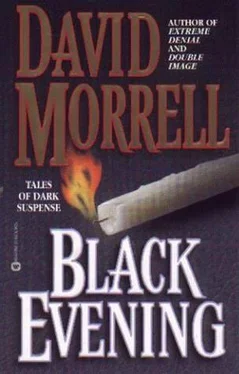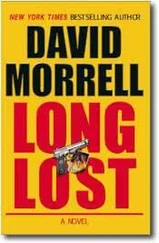David Morrell - Black Evening
Здесь есть возможность читать онлайн «David Morrell - Black Evening» весь текст электронной книги совершенно бесплатно (целиком полную версию без сокращений). В некоторых случаях можно слушать аудио, скачать через торрент в формате fb2 и присутствует краткое содержание. Жанр: Ужасы и Мистика, на английском языке. Описание произведения, (предисловие) а так же отзывы посетителей доступны на портале библиотеки ЛибКат.
- Название:Black Evening
- Автор:
- Жанр:
- Год:неизвестен
- ISBN:нет данных
- Рейтинг книги:4 / 5. Голосов: 1
-
Избранное:Добавить в избранное
- Отзывы:
-
Ваша оценка:
- 80
- 1
- 2
- 3
- 4
- 5
Black Evening: краткое содержание, описание и аннотация
Предлагаем к чтению аннотацию, описание, краткое содержание или предисловие (зависит от того, что написал сам автор книги «Black Evening»). Если вы не нашли необходимую информацию о книге — напишите в комментариях, мы постараемся отыскать её.
Black Evening — читать онлайн бесплатно полную книгу (весь текст) целиком
Ниже представлен текст книги, разбитый по страницам. Система сохранения места последней прочитанной страницы, позволяет с удобством читать онлайн бесплатно книгу «Black Evening», без необходимости каждый раз заново искать на чём Вы остановились. Поставьте закладку, и сможете в любой момент перейти на страницу, на которой закончили чтение.
Интервал:
Закладка:
"The Dripping" was my first published story and as such, despite its horrifying content, has great sentimental value for me. I had started First Blood at Penn State in 1968, but graduate courses, student teaching, and my Ph.D. dissertation on John Barth slowed the novel's progress. It was slowed even more after I graduated and moved to Iowa City, where most of my time was filled with teaching, course preparation, student conferences, faculty meetings, and my other responsibilities as an assistant professor of American literature at the University of Iowa. Finally, I completed the novel in the summer of 1971. Instead of feeling exhausted, however, I was bursting with energy and immediately began the story you are about to read. It is one of the few that occurred to me complete in a dream. When I wakened, I rushed to a typewriter and wrote it in one sitting.
The Dripping
That autumn, we lived in a house in the country, my mother's house, the house I was raised in. I have been to the village, struck even more by how nothing in it has changed, yet everything has, because I am older now, seeing it differently. I feel as though I am both here now and back then, at once with the mind of a boy and a man. It is so strange a doubling, so intense, so unsettling, that I am moved to work again, to try to paint it, studying the hardware store, the grain barrels in front, the twin square pillars holding up the drooping balcony onto which seared, wax-faced men and women from the old people's hotel above come to sit and rock and watch. They look the same aging people I saw as a boy, the wood of the pillars and balcony as splintered.
Forgetful of the hours while I work, I do not begin the long walk home until late, at dusk. The day has been warm, but now in my shirt I am cold, and a half mile along I am caught in a sudden shower, forced to leave the gravel road for the shelter of a tree, its leaves already brown and yellow. The rain becomes a storm, streaking at me sideways, drenching me. I cinch the neck of my canvas bag to protect my painting and equipment and decide to run. My socks are spongy in my shoes, repulsive, when at last I reach the lane down to the house and barn.
The house and barn. They and my mother alone have changed, as if as one, warping, weathering, their joints twisted and strained, their gray so unlike the brightness I recall as a boy. The place is weakening her. She is in tune with it. She matches its decay. That is why we have come here to live. To revive. Once I thought I could convince her to move away. But of her sixty-five years she has spent forty here, and she insists that she will spend the rest, what is left to her.
The rain falls stronger as I hurry past the side of the house, the light on in the kitchen, suppertime and I am late. The house is connected to the barn the way the small base of an L is connected to its stem. The entrance I have always used is directly at the joining, and when I enter, out of breath, my clothes cling to me cold and wet. The door to the barn is to my left, the door to the kitchen straight ahead, I hear the dripping in the basement down the stairs to my right.
"Meg. Sorry I'm late," I call to my wife, setting down my water-beaded canvas sack, opening the kitchen door. There is no one. No settings on the table. Nothing on the stove. Only the yellow light from the sixty-watt bulb in the ceiling, the kind my mother prefers to the brightness of a one-hundred watt. It reminds her of candlelight, she says.
"Meg," I call again, and still no one answers. They're asleep, I think. With dusk coming on, the dark clouds of the storm have lulled them, and they have lain down for a nap, expecting to wake before I return.
Still the dripping. Although the house is very old, the barn long disused, the roofs crumbling, I have not thought it all so ill-maintained, the storm so strong that water can be seeping past the cellar windows, trickling, pattering on the old, stone floor. I switch on the light to the basement, descend the wooden stairs to the right, worn and squeaking, reach where the stairs turn to the left the rest of the way down to the floor, and see not water dripping, but milk. Milk everywhere. On the rafters, on the walls, dripping on the film of milk on the stones, gathering speckled with dirt in the channels between them. From side to side and everywhere.
Sarah, my child, has done this, I think. She has been fascinated by the big, wooden dollhouse that my father made for me when I was young, its blue paint chipped and peeling now. She has pulled it from the far corner to the middle of the basement. There are games and toy soldiers and blocks that have been taken from the wicker storage chest and played with on the floor, all covered with milk, the dollhouse, the chest, the scattered toys, milk dripping on them from the rafters, milk trickling on them.
Why has she done this? I think. Where can she have gotten so much milk? What was in her mind to do this thing?
"Sarah," I call. "Meg." Angry now, I mount the stairs to the quiet kitchen. "Sarah," I shout. She will clean the mess and stay indoors the remainder of the week.
I cross the kitchen, turn through the sitting room past the padded, flower-patterned chairs and sofa that have faded since I knew them as a boy, past several of my paintings that my mother has hung on the wall, brightly colored old ones of pastures and woods from when I was in grade school, brown-shaded new ones of the town, tinted as if old photographs. Two stairs at a time up to the bedrooms, my wet shoes on the soft, worn carpet on the stairs, my hand streaking on the smooth, polished, maple banister.
At the top, I swing down the hall. The door to Sarah's room is open. It is dark in there. I switch on the light. She is not on the bed, nor has she been. The satin spread is unrumpled, the rain pelting in through the open window, the wind fresh and cool. I have a bad feeling then and go uneasily into our bedroom. It is dark as well, empty. My stomach has become hollow. Where are they? All in my mother's room?
No. As I stand at the open door to my mother's room, I see from the yellow light that I turned on in the hall that only she is in there, her small torso stretched across the bed.
"Mother," I say, intending to add "Where are Meg and Sarah?" But I stop before I do. One of my mother's shoes is off, the other askew on her foot. There is mud on her shoes. There is blood on her cotton dress. It is torn, her brittle hair disrupted, blood on her face. Her bruised lips are swollen.
For several moments, I am silent with shock. "My God, Mother," I finally manage to say, and as if the words are a spring releasing me to action, I touch her to wake her. But I see that her eyes are open, staring toward the ceiling, unseeing although alive, and each breath is a sudden full gasp, then a slow exhalation.
"Mother, what has happened? Who did this to you? Where are Meg and Sarah?"
But she does not look at me, only toward the ceiling.
"For God's sake, Mother, answer me! Look at me! What has happened?"
Nothing. Her eyes are sightless. Between gasps she is like a statue.
What I think is hysterical. Disjointed, contradictory. I must find Meg and Sarah. They must be somewhere, beaten like my mother.
Or worse. Find them. Where? But I cannot leave my mother. When she becomes alert again, she too will be hysterical, frightened, in great pain. How did she end up on the bed?
In her room, there is no sign of the struggle she must have put up against her attacker. It must have happened somewhere else. She crawled from there to here. Then I see the blood on the floor, the swath of blood down the hall from the stairs. Who did this? Where is he? Who would beat a gray, wrinkled, arthritic old woman? Why in God's name would he do it? I imagine the pain of the arthritis as she struggled with him.
Читать дальшеИнтервал:
Закладка:
Похожие книги на «Black Evening»
Представляем Вашему вниманию похожие книги на «Black Evening» списком для выбора. Мы отобрали схожую по названию и смыслу литературу в надежде предоставить читателям больше вариантов отыскать новые, интересные, ещё непрочитанные произведения.
Обсуждение, отзывы о книге «Black Evening» и просто собственные мнения читателей. Оставьте ваши комментарии, напишите, что Вы думаете о произведении, его смысле или главных героях. Укажите что конкретно понравилось, а что нет, и почему Вы так считаете.












